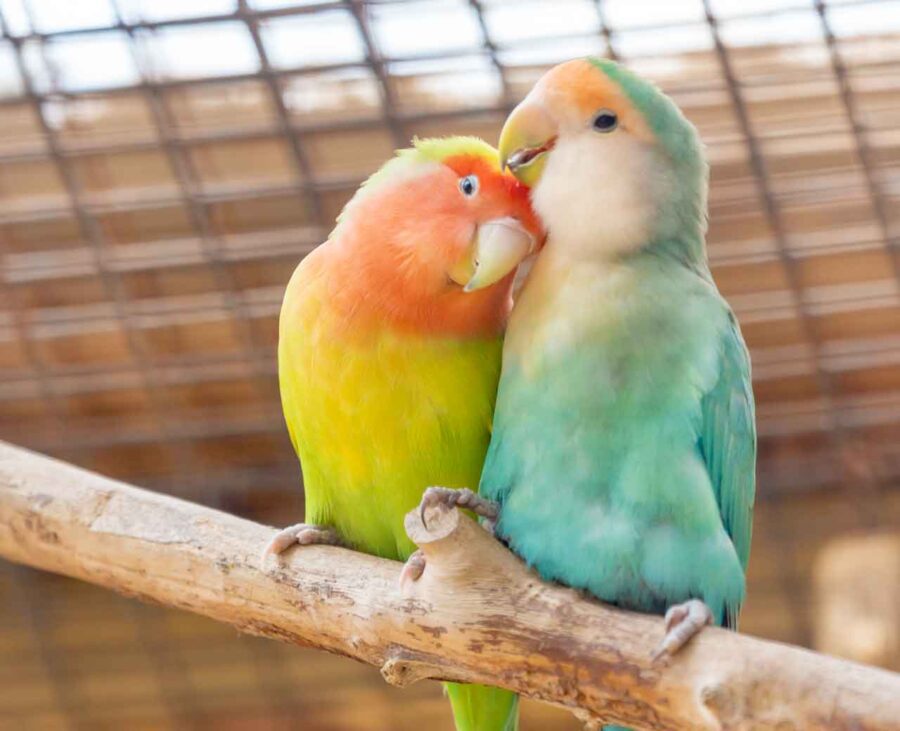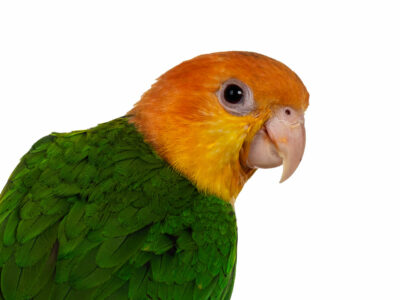
What to Know About Pet Lovebirds: A Guide for Potential Owners
If you’re looking for a small parrot with a big personality, the lovebird may be the perfect fit. These colorful companions are affectionate, energetic, and full of character. Despite their tiny size, lovebirds are incredibly social and thrive with attention and stimulation. Here’s what to know if you’re considering adding a lovebird to your home.
What Do Lovebirds Look Like?
Lovebirds are small parrots, measuring about 5 to 7 inches long. They come in a wide range of stunning color mutations, but the most common species have green bodies with bright red, orange, or peach faces. Their stocky build, short tails, and expressive eyes give them a charming, toy-like appearance.
There are nine species of lovebirds, but the most popular in aviculture are peach-faced lovebirds, Fischer’s lovebirds, and masked lovebirds. While all of these are lively and social, each has subtle differences in appearance and temperament.
Are Lovebirds Good Pets?
Lovebirds can make wonderful pets—but they aren’t for everyone. Despite their sweet name, these birds are bold, vocal, and often feisty. They form strong bonds with their favorite person (or another bird) and require daily social interaction to stay happy and well-adjusted.
While they’re affectionate and curious, lovebirds can also be territorial and nippy if not properly socialized. However, with patient, positive reinforcement training, many become devoted, cuddly companions.
Should You Get One or Two Lovebirds?
Lovebirds are famous for bonding closely with a mate, which is how they earned their name. However, a single lovebird can also thrive with ample human interaction. If you’re home often and enjoy bonding with a bird one-on-one, a solo lovebird might be right for you. If you tend to go away for long stretches of time—or you want your bird to have a feathered companion—you might consider a pair. Just keep in mind:
- Bonded lovebirds may focus more on each other than on you
- Two birds will require more space, toys, and supplies
- Compatibility matters—introductions should be slow and supervised
How Much Space Do Lovebirds Need?
Despite their small size, lovebirds are active and need plenty of room to fly, climb, and play. Their cage should meet the following specifications:
- At least 18” x 18” x 18” for one bird, although larger is better
- Bar spacing should be no more than ½ inch
- Filled with a variety of toys, perches, and foraging opportunities
Lovebirds also need supervised out-of-cage time every day to stretch their wings and explore safely.
What Do Lovebirds Eat?
A healthy lovebird diet should include:
- High-quality pellets and/or seeds formulated for small parrots
- Fresh vegetables (e.g., leafy greens, carrots, peppers)
- Occasional fruits and other treats
As with other types of birds, always be cautious to avoid toxic foods such as avocado, chocolate, alcohol, caffeine, and anything salty or sugary.
Are Lovebirds Noisy?
While lovebirds are not the quietest small parrots, they aren’t as loud as cockatoos or conures. They tend to chirp, chatter, and squawk as a way to communicate, particularly when they’re excited or seeking attention. Lovebirds do not talk like some larger parrots, but they can mimic sounds and develop a repertoire of cute vocalizations—an important consideration if you’re sensitive to noise or live in close quarters.
How Long Do Lovebirds Live?
With proper care, lovebirds typically live about 10 to 15 years, though some can live longer. As with most other pets, their lifespan will depend on factors such as genetics, diet, environment, and veterinary care.
Is a Lovebird Right for You?
Lovebirds are ideal for bird lovers seeking a compact and beautiful companion with a bold spirit. With consistent handling, enrichment, and social interaction, they can thrive as pets, bringing a playful, sometimes sassy, and deeply loyal feathered friend to your home.
Still deciding which bird is right for you? Take our free matchmaker quiz to get personalized recommendations based on your lifestyle!





